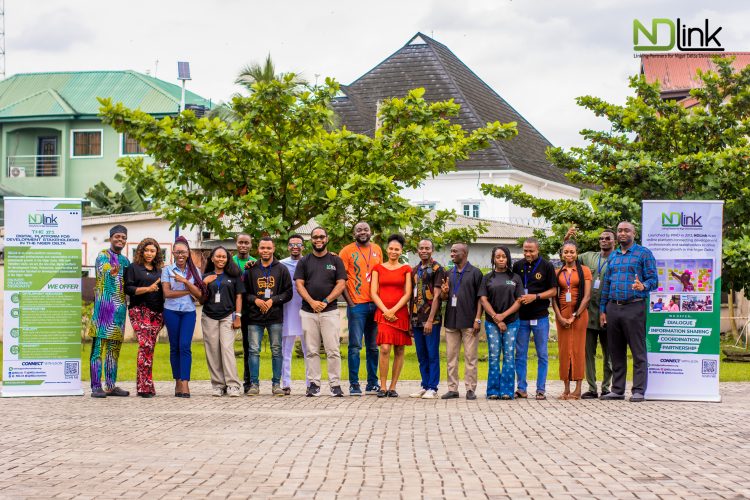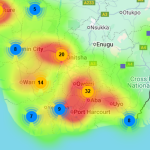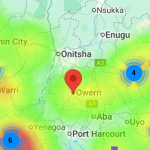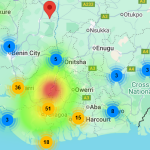
Rivers, PIND focuses on job creation for youths to tackle crime
October 12, 2018Benin Electricity Distributor to pilot mini-grid systems in Edo State
October 19, 2018Effects of Meat Consumption on Climate Change and what needs to change in Nigeria
By Obinna Ejide
As a teenager in a public secondary school in Lagos, Nigeria, as dependent as we were on our parents for daily bread, I noticed that—even for the poorest of them—meat always constituted about 50% of the cost of the meal my friends bought for breakfast or lunch.
The absence of meat in Nigerian foods is like an aberration; when you do not see any chunk of meat over, say, a plate of white rice and stew, to children—this may result in a little grumble, while an adult may consider it a disrespect. What, then, do you want to tell meat lovers about this meat if not that you want to bless them with a plate of goat meat pepper soup and a bottle of beer in a popular restaurant across the street? How do you convince them, without biting your tongue, that this meat they love so much is a major reason for the increased heat in the world they live in?
Because, if you consider, the global livestock industry produces more greenhouse gas emissions than all cars, planes, trains, and ships combined. Greenhouse gas (GHG) emissions are emissions of carbon dioxide (CO2) from burning fossil fuel—mostly during land-use changes, methane gas (CH4) from livestock production, and nitrous oxide (N2O) from agricultural intensification, which cause the depletion of the Ozone layer, which ultimately results in increased world average temperature, a condition referred to as Global Warming.
The Ozone layer is a covering above the earth’s crust that protects the earth’s surface from the damaging effects of ultraviolet radiations of the sun, which include drought, over-flooding due to melting office in the polar regions, famine, etc.
Intensive livestock-rearing is responsible for the emission of vast amounts of GHGs. Methane, produced chiefly by bacteria in the gut of ruminant animals like cattle, sheep and goats, and nitrous oxide (from grain-feed fertilizers) are considered far more dangerous than CO2.
Methane traps more radiation than CO2, although it decomposes faster. In a review (pdf), nitrous oxide, also known as laughing gas, is said to an atmospheric lifetime of approximately 114 years. It has been shown that methane and nitrous oxide have global warming potentials that are 25 and 300 times greater than CO2, respectively, even though both are released in smaller amounts.
The energy loss at each trophic level is the reason for meat’s higher emission release per unit of energy, compared with plant foods. In Cameroon, for instance, animals eat ten times more feed just to produce a kilogram of protein, and this unit kilogram of protein contains 1000 kilograms of methane. Meat farming, particularly cattle farming, is responsible for mass deforestation of rainforests.
Rainforests help to trap carbon through photosynthesis, so are very important in maintaining a balanced carbon cycle in the environment. Research shows that meat (and diary) provide just 18% of calories but take up 83% of farmlands, producing 60% of agriculture’s GHG emissions; and that raising beef cattle on deforested land led to the release of GHGs 12 times more, and the use of land 50 times more, than those grazing natural pasture.
These researches, and many more, in literature reviews, were stimulated by the Livestock’s Long Shadow report of the United Nations Food and Agriculture Organization, which implicates meat production in climate change; that it accounts about 18% of the world’s entire GHG emissions. And they have become critical in the climate change narrative because of the rising world global temperature.
Scientists are seriously advising against limiting the global average temperature to 2°c, that going past the 1.5°c of the Paris Agreement is dicing with the planet’s liveability, and that this “guard rail” could be surpassed in 2030. And there is no much time; the production and consumption of meat and dairy products in the world must be halved by 2050 to prevent adverse climate changes.
Ever since Nigeria plunged into its first economic recession after twenty-five years in 2016, due to the slump in the price of oil in the international market starting from June 2014, there have been calls to shift from the dependency on crude oil to intensifying agricultural production. But there needs to be an understanding of the nexus between climate change and the quest for economic development. For example, China accounts for over 30% of global carbon emission.
ALSO READ: UK’s £70m programme plan to create 100,000 jobs in Nigeria
Greek Investors To Construct Ship-Building Plant In Niger Delta
Opinion: Why dreadful viral diseases are now upon us
Nigeria contributes just over 1%, and it is estimated that 13% of this GHG emission (CO2 equivalent) annually comes from agriculture. To cite an example—the nomadic practice by Fulani herdsmen of Northern Nigeria, where their cows and cattle are allowed to roam freely across the country, causes destructions of farm crops; the weight of these destructions is heavy, given the loss of lives from bloody clashes between nomads and locals.
And since the present administration is playing deaf to the cries of Nigerians concerning this issue, the effect is that local farmers would become afraid to grow crops beyond subsistent farming, leading to the conversion of agricultural land for other activities that do not support the trapping of atmospheric CO2, thus adding to the 52% of GHG emissions contributed by land-use in Nigeria.
The conversion of land for livestock rearing in Nigeria is as a result of the increasing demand for meat. The total beef consumption in Nigeria stands at about 360,000 tonnes per annum, with that figure expected to increase to 1.3 million tonnes by 2050, according to Akinwunmi Adeshina, President of the African Development Bank, during a function in Abuja as former Minister of Agriculture and Rural Development in Nigeria, in 2014. 1.3 million tonnes is equivalent to 1.3 billion kg, which releases 39 billion kg of carbon dioxide if we consider that 1 kg of beef releases about 30 kg of GHG.
It is uncertain whether this futuristic projection of tonnes to be consumed in 2050 reflects closely—or at all—the population projection of Nigeria by the United Nations, whose report on population estimates that Nigeria would become the third most populous country in the world by 2050, contributing 10% of the expected 2.2 billion increase in world population. And the demand for beef in Nigeria remains a necessity among households, according to research (pdf).
From my learning as an MBA (Marketing) student, it is very difficult to change the attitude of people, and as such, any attempt to do so is not advised, for economic reasons. In the context of reducing the consumption of meat in Nigeria, this advice is worthwhile because religion and residential areas play a key role in the decisions regarding the consumption (or not) of meat. For example, Muslims in Northern Nigeria, as well as those in Southern Nigeria celebrate religious activities with cows, ram, and goat meat. On the other hand, Muslim faithful refrain from eating pig meat because the Holy Quran forbids Muslims from doing so. Going by this, any intervention directed towards reducing the consumption of, say, cow beef in the North, or its substitution with the more environmentally friendly pork, would be met with strict opposition.
However, acting upon existing cues that could drive the reduction in the demand for meat could force its consumption and, subsequently, production to reduce. For example, unhealthy dietary lifestyles, like too much consumption of red and processed meat, are associated with pancreatic cancer. From taking the lives of young and old celebrities to that of public figures, and even to those of friends and families, cancer is a popular and dreaded illness in Nigeria.
Fruits and vegetables have been shown to lower the risk of cancer. Hence, interventions can be centered on how to improve the dietary lifestyle of consumers for their health benefits. Interestingly, a cue can also be taken from believers who highly revere the words of their religious ministers. A study of Nigerian Christians in the UK (pdf) showed that religious leaders (and health providers) from Nigeria can become influential in health decisions. The association between belief and behaviors can be used to encourage good health-seeking behaviours, thus there is a need to carry along religious leaders in optimizing such interventions on improving dietary lifestyle.
Change in dietary behaviors in response to interventions is slow, but if we attempt to change the social norms surrounding those dietary behaviors, we would go a long way in reducing the demand for meat. For instance, in Nigeria, eating plant-based foods like pap (cornmeal) or garri is commonly associated with poverty; to prove that income levels have risen, people eat all kinds of meaty foods to grow fat.
The Federal Government of Nigeria, through its various health ministries, departments or agencies, could fix this by using influential celebrities or public figures who the populace perceive to be rich, to champion this cause. Once upon a time, a popular video of former President of Nigeria, Olusegun Obasanjo, drinking garri enthused Nigerians. Imagine the level of impact it would have had if such video was directed towards creating awareness for climate change mitigation.
Cattles and cows are multiplying in great numbers because of the current practice of nomadic farming. The federal government of Nigeria should change the grazing laws that allow livestock roam about freely about the country; nomads should be provided ranges for grazing limited by boundaries, so as to reduce the number of livestock growing in a ranch at a particular time. This may result in an increase in the price of meat due to a reduction in the production of meat, which is an opportunity to encourage the non-intensive rearing of livestock on marginal land. Animals to be reared in-house could range from goats to chicken, to pig, which has lower carbon footprints than cattle beef. The demand for beef in Nigeria remains a necessity among households, but if we could substitute it with meat from other livestock whose production have lower effects on climate change, we would have a better ecosystem.
Also, 2019 would witness another democratic general election in Nigeria. Nigeria needs a government that is blend with futurists, technocrats, bureaucrats and intellectuals—leaders who are able to address the needs of the present without compromising the ability of future generations to meet their own needs. The quest to reduce meat consumption or productions comes off naturally as unattractive, but if Nigerians elected strong men and women who would be bold enough to steer the conversation accordingly and emphasize the need for it to work towards achieving its Paris Agreement commitment to reducing GHG emissions unconditionally by 20% and conditionally by 45%, as well as achieving the Sustainable Development Goal 13 (Climate Action) of the United Nations, it would motivate civil society groups and non-governmental organizations to coordinate efforts towards activism for the reduction of meat consumption and/production.
To end, climate change is a threat to the existence of mankind, and meat consumption has been implicated in this problem. From exploiting cues around consumer behaviour in creating interventions for dietary lifestyle changes, to providing grazing areas to limit number of livestock per area, and also electing leaders who are capable of championing the cause for a better environment, Nigeria can do well to fulfil its own pledge of the Paris Agreement and, most importantly, secure the future of its people and the world.
About the author
Obinna Ejide a contributor, writes from Lagos, Nigeria. Find him on Facebook, Obinna Ejide
Disclaimer: The opinions expressed in this article are those of the author not of NDLink
Photo Credit: StraitsTimes










